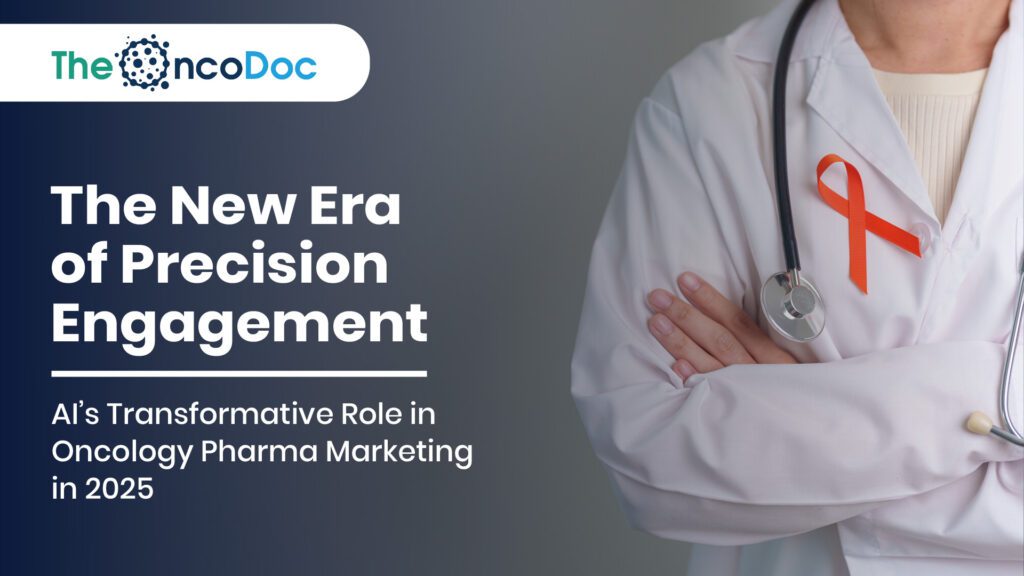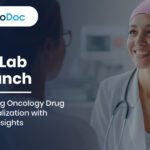Introduction: Precision Marketing at a Tipping Point
Oncology pharma marketing has entered a defining moment in 2025, where artificial intelligence (AI) is not simply a technology upgrade but a fundamental shift in engagement models. Traditional campaigns, driven by static ads and generalized outreach, are being replaced by evidence-first, hyper-personalized, and patient-centric strategies.
The oncology landscape is more competitive than ever, with immunotherapies, CAR-T therapies, precision diagnostics, and digital therapeutics transforming cancer care. In this ecosystem, trust, personalization, and measurable outcomes are essential for brand success. AI is enabling pharma companies to move beyond transactional marketing to build ecosystems of education, empowerment, and ethical engagement for both patients and healthcare professionals (HCPs).
This article explores how AI is reshaping oncology marketing end-to-end, from R&D insights to ethical communication, operational excellence, and measurable brand impact.
1. The Decline of Traditional Pharma Marketing
For decades, pharma marketing relied on mass campaigns and broad claims, often creating skepticism among HCPs and patients. Oncology, being a high-stakes therapeutic area, requires credibility over promotion. The shortcomings of traditional marketing include:
- Over-reliance on direct-to-consumer (DTC) ads that emphasize benefits over risks.
- Regulatory risks, as shown by billion-dollar settlements for off-label promotions.
- Inefficient use of mass media channels that fail to personalize patient journeys.
- Declining click-through rates as search platforms prioritize AI-generated summaries over brand websites.
In 2025, these challenges have accelerated the need for AI-driven transformation, where data-backed strategies replace intuition and manual campaign planning.
2. AI as a Commercial Game-Changer
AI is becoming a business tool for oncology marketing, not just a trendy term. Its applications span:
- Hyper-Personalization: AI integrates genomic data, EHRs, behavioral insights, and geolocation to craft patient- and HCP-specific narratives.
- Predictive Insights: AI predicts disease prevalence, enabling pharma to launch campaigns proactively.
- Operational Efficiency: Automated content creation, supply chain optimization, and predictive inventory reduce costs.
- Real-Time Optimization: Campaigns can now adjust based on audience sentiment and engagement patterns.
3. R&D as the Foundation of Marketing Intelligence
AI-driven oncology marketing success begins upstream in R&D. Clinical data and research insights shape campaigns that are evidence-first, improving trust with oncologists and payers.
- AI-Powered Clinical Trial Recruitment: AI reduces recruitment time by 30%, ensuring trial diversity.
- Dynamic Protocols: AI models continuously analyze trial results, adjusting study designs to improve success rates.
- Marketing Impact: Real-world evidence (RWE) collected during trials becomes the foundation for personalized, data-backed campaigns.
4. Shifting to AI-Optimized Brand Visibility
Traditional search engine optimization (SEO) is no longer sufficient in light of the increase in zero-click searches. AI-generated summaries are now the first point of contact for patients and HCPs.
Strategic Focus Areas:
- Create structured, trustworthy datasets that AI platforms prioritize.
- Build AI optimization teams to influence AI search algorithms.
- Integrate ethical disclosures, making transparency a differentiator.
5. Patient-Centricity as the Core of Oncology Marketing
Patients today expect personalized, continuous engagement beyond prescription. AI tools like symptom trackers, virtual coaches, and wearable-integrated apps allow pharma brands to become long-term partners in care.
Key patient engagement strategies include:
- Customized educational journeys that evolve based on patient needs.
- AI-driven chatbots offering 24/7 triage and treatment FAQs.
- Alerts based on wearable data, enabling early intervention.
6. Redefining HCP Engagement
Oncologists demand actionable, evidence-backed insights instead of generic promotions. AI-driven marketing campaigns analyze:
- Prescribing trends and peer-reviewed studies.
- Regional cancer burden and demographic patterns.
- Preferred digital formats (case studies, webinars, or peer discussions).
This approach has been shown to increase oncologist engagement by 60% and improve prescription lift rates by over 25%.
7. Behavioral Insights in Oncology Campaigns
Behavioral science, powered by AI analytics, helps design campaigns that encourage preventive actions.
Examples:
- Personalized mammogram reminders during Breast Cancer Awareness Month.
- Gamified health quizzes to encourage early detection.
- Rewards for screening participation, improving attendance by 30%.

8. Emotional Storytelling Powered by AI Insights
Cancer is deeply emotional. AI assists in determining which delivery methods, tone, and survival stories patients respond to the most.
- AI sentiment analysis guarantees that campaigns are compassionate rather than fear-based.
- Compared to generic advertisements, survivor-led storylines generate 40% more engagement.
- Personalized video recommendations boost patient trust and adherence.
9. AI-Powered Predictive Marketing
AI predicts disease trends and patient needs by scanning search patterns, social media, and medical databases.
- Example: If AI detects a surge in “persistent cough” queries in a region, pharma brands can deploy targeted campaigns and screening camps proactively.
- Predictive marketing also helps allocate resources effectively, avoiding waste.
10. Ethical AI Governance: A Market Differentiator
AI adoption in healthcare raises valid ethical concerns around bias, fairness, and transparency. Companies are embracing Explainable AI (XAI) to maintain trust:
- AI Ethics Councils make ensuring campaigns adhere to moral and legal requirements.
- Clear disclosures for synthetic content enhance transparency.
- Bias detection algorithms help ensure diversity in patient outreach.
In oncology, ethics equals credibility. Brands that prioritize fairness and explainability will emerge as trusted partners.

11. The Role of Wearables and IoT
Wearable devices are redefining cancer prevention campaigns:
- Continuous monitoring of vitals and symptom data.
- AI-powered risk warnings for doctors and patients.
- Integration with pharma platforms for personalized educational nudges.
12. Hyperlocal, Vernacular Campaigns
Localized campaigns, powered by AI, deliver better engagement.
- Regional languages ensure comprehension and trust.
- AI identifies high-risk zones for targeted screening drives.
- Folk media integration enhances rural outreach.
13. Omnichannel Engagement in the AI Era
AI-driven campaigns integrate multiple touchpoints seamlessly:
- Social media storytelling for emotional resonance.
- Personalized email campaigns for oncologists.
- Mobile apps offering screening reminders.
- AR/VR training modules for clinicians.
14. Supply Chain and Market Access Optimization
AI strengthens operational resilience:
- Predictive inventory management reduces stockouts.
- AI-generated market access dossiers streamline payer approvals.
- Cost-efficiency enables brands to reinvest in patient-focused initiatives.
15. Creating Supportive Digital Communities
Through the creation of lively, emotional support networks for cancer patients, survivors, and caregivers, AI-powered platforms are revolutionizing patient engagement.
- Expert-Led Interactions: These communities regularly host live Q&A sessions and webinars with leading oncologists, providing trusted medical guidance.
- Inclusive Counseling: Multilingual counseling services ensure accessibility, offering emotional and psychological support to diverse patient groups.
- Authentic Brand Presence: Pharma brands engage meaningfully through educational initiatives rather than overt promotion, building credibility and trust.
These AI-driven digital ecosystems empower patients with knowledge, emotional strength, and peer connections, creating a safe, supportive space that strengthens brand relationships while promoting improved cancer awareness and treatment adherence.
16. Smart Chatbots and Virtual Coaches
Smart chatbots have evolved into intelligent, personalized care companions for oncology patients.
- Personalized Assistance: Advanced AI models analyze medical history and behavioral data to deliver accurate, tailored responses.
- Multilingual Accessibility: Voice-enabled support in multiple regional languages ensures inclusivity and enhances rural outreach.
- Seamless Integration: These bots connect with appointment booking systems, lab reports, and telehealth platforms to streamline consultations.
By offering 24/7 guidance, emotional support, and practical resources, AI-powered chatbots and virtual coaches empower patients to better manage their cancer journey, improve adherence, and access timely care with convenience and confidence.
17. Real-Time Social Listening
AI-powered social listening detects harmful myths quickly, enabling pharma to:
- Deploy counter-messaging campaigns in real time.
- Collaborate with KOLs and influencers for credibility.
- Correct misinformation through localized videos and infographics.

18. Digital Twins for Precision Marketing
AI-powered digital twin technology creates virtual replicas of patients, revolutionizing how oncology brands approach engagement.
- Predictive Insights: Digital twins help forecast treatment responses with high accuracy, improving therapy planning.
- Content Simulation: Marketers can design campaigns by virtually testing messaging impact on diverse patient profiles.
- Unmatched Personalization: These models enable ultra-targeted communication strategies, ensuring that every message resonates with individual patient needs.
By merging clinical, genomic, and behavioral data, digital twins transform marketing from a one-size-fits-all approach to a data-driven precision ecosystem that builds trust and drives better patient outcomes.
19. Partnerships with NGOs and Governments
Partnerships with NGOs and government agencies are driving impactful oncology awareness initiatives.
- Data-Driven Campaigns: AI-powered analytics provide region-specific insights to guide targeted health interventions.
- Rural Outreach: Pharma brands co-sponsor screening camps and awareness drives in underserved communities, enhancing trust and visibility.
- Cost-Effective Scale: Collaborations help optimize resources, reduce operational expenses, and extend campaign reach to millions.
By aligning with national cancer control programs and local NGOs, brands position themselves as healthcare partners rather than mere product providers, fostering credibility while supporting large-scale cancer prevention and early detection efforts.
20. Gamification in Awareness Campaigns
Campaigns to raise awareness of cancer are becoming more engaging and inspiring thanks to gamification.
- Higher Participation: Quizzes, health challenges, and reward systems increase engagement and encourage proactive screening, boosting participation rates by nearly 30%.
- Community Involvement: District-level competitions and leaderboards drive healthy competition, fostering collective action in rural and urban regions.
By blending education with entertainment, gamified campaigns make preventive healthcare more accessible and appealing. These initiatives not only spread awareness but also create a sense of achievement, inspiring communities to prioritize early detection and take ownership of their health journeys.
21. AR/VR Training for Oncologists
Augmented Reality (AR) and Virtual Reality (VR) are revolutionizing oncology education by offering immersive, hands-on learning experiences.
- Deep Understanding: 3D simulations allow oncologists to visualize complex molecular mechanisms and drug interactions.
- Virtual Practice: Rare cancer surgeries and intricate procedures can be safely rehearsed in a virtual setting.
- Continuous Advancement: Interactive platforms help clinicians stay updated with evolving treatment protocols and innovative therapies.
This cutting-edge approach bridges the gap between theoretical knowledge and practical application, empowering oncologists to deliver more precise, confident, and patient-centered care while fostering innovation in cancer treatment strategies.
22. Metrics That Matter
Traditional vanity metrics like clicks and impressions are being replaced with AI-driven, outcome-focused KPIs.
- Screening Impact: Measuring the number of early detection tests booked through campaigns.
- HCP Engagement: Tracking the depth and quality of oncologist interactions.
- Treatment Outcomes: Monitoring prescription lift, adherence rates, and patient response trends.
- Sentiment Insights: Using AI sentiment analysis to ensure emotionally resonant messaging.
These advanced metrics provide a clearer picture of campaign effectiveness, helping brands demonstrate tangible value, improve strategies, and focus on outcomes that truly matter: early detection, patient trust, and better health results.
23. AI-Driven Payer Engagement
High-cost oncology therapies often face reimbursement challenges, but AI is streamlining payer interactions and decision-making.
- Value-Based Documentation: AI creates comprehensive, evidence-backed dossiers highlighting therapy benefits.
- Predictive Analytics: Cost-benefit models forecast financial impact and long-term savings for healthcare systems.
- Outcome-Driven Insights: Data demonstrates improved patient survival rates, adherence, and reduced hospitalizations.
By presenting clear, data-driven evidence, pharma brands build stronger payer relationships and accelerate market access for innovative treatments. This AI-powered approach positions oncology therapies as investments in long-term patient health, making reimbursement discussions more collaborative and impactful.
24. Strategic Roadmap for Oncology Marketing Excellence in 2025 and Beyond
The future of oncology pharma marketing demands innovation, transparency, and a deeply patient-centric approach.
- Evidence-Led Campaigns: Leverage real-world evidence (RWE), clinical insights, and trial data to enhance credibility.
- AI Optimization Expertise: Form dedicated teams to ensure brand visibility across AI-driven search platforms and emerging digital ecosystems.
- Emotional Connection: Survivor-led narratives and authentic storytelling help build trust and humanize brands.
- Ethical Governance: Establish AI Ethics Councils to address bias, ensure compliance, and promote transparency as a competitive advantage.
- Cross-Functional Integration: Break silos between R&D, marketing, and operations for unified AI adoption.
- Comprehensive Patient Support: Move beyond prescriptions by offering resources for survivorship, mental health, and long-term care.
These strategic priorities will help oncology brands lead with trust, precision, and measurable impact, positioning them as partners in improving cancer care outcomes while driving sustainable growth.
Conclusion: From Campaigns to Care Ecosystems
In 2025, oncology pharma marketing is not about selling therapies, it’s about saving lives through precision engagement. AI enables companies to become trusted partners, creating an ecosystem where every message, interaction, and touchpoint is evidence-based, emotionally intelligent, and ethically governed.
Brands that embrace AI as a strategic pillar, not a siloed tool, will shape the future of cancer care, driving earlier detection, better treatment adherence, and improved survival outcomes, while earning the trust of patients, providers, and payers alike.
The Oncodoc team is a group of passionate healthcare and marketing professionals dedicated to delivering accurate, engaging, and impactful content. With expertise across medical research, digital strategy, and clinical communication, the team focuses on empowering healthcare professionals and patients alike. Through evidence-based insights and innovative storytelling, Hidoc aims to bridge the gap between medicine and digital engagement, promoting wellness and informed decision-making.



